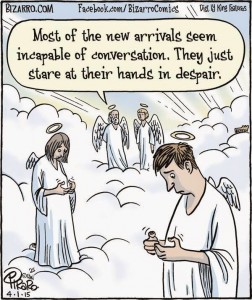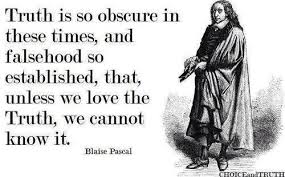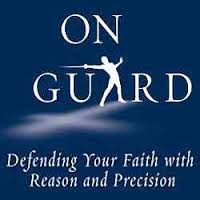- ABOUT
- ARGUMENTS – EXISTENCE OF GOD
- The Argument from Contingency
- Cosmological Argument
- Moral Argument
- Ontological Argument
- Teleological/Design/Fine-tuning Argument
- Pascal’s Wager
- The Argument from Religious Experience
- The Argument from Miracles
- The Argument from Consciousness
- The Argument from Truth
- The Argument from Desire
- The Argument from Aesthetic Experience
- HISTORICITY – RESURRECTION
- CHRISTIANITY & ISLAM
- APOLOGETICS
 I’m sure you’ve heard, as I have, the oft repeated phrase, ‘all paths lead to God,’ or ‘all religions are fundamentally the same and have the same goal, leading one to God.’ In the pluralistic societies in which we live, this ‘all paths lead to God’ philosophy is one of the crowning virtues (along with the new ‘tolerance’-but that is a topic for another time) which is affirmed in order that we can all live together in peace, be sure not to exclude or offend anyone, and by so doing, live happily ever after. However, this philosophy, or relativistic worldview, has a few particular flaws which are glaringly apparent once one actually takes the time to ask the age old question, ‘but, is it true?’ Poet Steve Turner offers the following brilliant summary of what many think when it comes to religion:
I’m sure you’ve heard, as I have, the oft repeated phrase, ‘all paths lead to God,’ or ‘all religions are fundamentally the same and have the same goal, leading one to God.’ In the pluralistic societies in which we live, this ‘all paths lead to God’ philosophy is one of the crowning virtues (along with the new ‘tolerance’-but that is a topic for another time) which is affirmed in order that we can all live together in peace, be sure not to exclude or offend anyone, and by so doing, live happily ever after. However, this philosophy, or relativistic worldview, has a few particular flaws which are glaringly apparent once one actually takes the time to ask the age old question, ‘but, is it true?’ Poet Steve Turner offers the following brilliant summary of what many think when it comes to religion:
“Jesus was a good man just like Buddha, Mohammed, and ourselves. We believe he was a good teacher of morals but we believe that his good morals are really bad. We believe that all religions are basically the same, at least the one we read was. They all believe in love and goodness, they only differ on matters of creation, sin, heaven, hell, God, and salvation.”
As one can see, all religions may be wrong, but they cannot all be right. Every religion differs vastly on ‘matters of creation, sin, heaven, hell, God, and salvation,’ and as such, the law of non-contradiction rules out the ‘truth’ claims that ‘all paths lead to God’ and that ‘all religions are the same,’ simply because each religion offers conflicting, and exclusive truth-claims, as to what the path is. Even though pluralistic interpretations of religion…possess a strong intuitive appeal, nevertheless, they possess two deficiencies which, in the final analysis, render them unacceptable.
- First, they are unable adequately to account for the conflicting truth-claims among various religions.
- Second, in order to avoid the latter problem, they radically reinterpret the beliefs of specific traditions in ways that fundamentally distort these beliefs.
The Achilles’ heel of the assumption that all paths lead to the same destination is the problem of conflicting truth-claims. Every religious tradition makes truth-claims and some of these truth-claims contradict the truth-claims of other religious traditions.[1]
Let’s test the ‘truth-claim’ of ‘all paths lead to God,’ by comparing the truth claims of the other major religions to that of Christianity:
It would seem that the ‘all paths lead to God’ ‘truth-claim’ has failed the truth test miserably, as well as ‘all religions are relatively the same.’ At best, all religions are superficially the same, although, even that is a stretch, but they are absolutely fundamentally different.
Now some may say, “when you compare the Sermon on the Mount, and Buddha’s Dhammapada, Lao-tzu’s Tao-te-ching, Confucius’ Analects, the Bhagavad Gita, the Proverbs of Solomon, and the Dialogues of Plato, you will find that they are in real, profound, and strong agreement.” Well that may be the case, but this is not a comparison of religion, but of ethics. The essence of religion is not ethics considering that everyone has a code of ethics, but not everyone has a religion. Ethics may be a first step in religion, but it is certainly not the fundamental one.[2] Every religious worldview, or any worldview, for that matter, must be accessed on where they stand in relation to the big four questions—origins, purpose/meaning, morality, and ultimate destiny. In his book, “God is Not One,” Stephen Prothero concurs, “The Golden Rule can be found not only in the Christian Bible and the Jewish Talmud but also in Confucian and Hindu books. No religion, however, sees ethics alone as its reason for being…The world’s religious rivals do converge when it comes to ethics, but they diverge sharply on doctrine, ritual, mythology, experience, and law. These differences may not matter to mystics or philosophers of religion, but they matter to ordinary religious people.”[3]
Let’s continue on with the truth testing.
In the following analysis, Keith E. Johnson posits three (of the many) areas of contradiction within the major religions worldviews, which further refute the ‘all paths lead to God’ claim:
(1) The first area of contradiction regards the nature of the ultimate reality (such as God). One discovers there is a vast chasm between monotheistic religions (such as Judaism, Christianity and Islam), and pantheistic religions (such as Hinduism, Buddhism). Muslims claim that there is only one God, Allah, who created the universe from nothing. Some Hindus, on the other hand, believe not in a personal creator but in an impersonal absolute reality (Brahman) which permeates all things. Other Hindus believe that there are millions of deities (such as Brahma, Vishnu, Shiva, and Krishna) which are manifestations of Brahman.
(2) A second area of contradiction relates to the fate of individuals at death. According to Islam, each person will die once and then face judgment by Allah. Depending on Allah’s judgment, a person will spend eternity in heaven or hell. In contrast, many Hindus assert that people will live (and have already lived) many lives. Moreover, Hindus believe that the conditions of one’s past and future existence are determined by the cosmic laws of karma. Following death each of us is reincarnated into a different form (human, animal, etc.).
(3) Each religious tradition also identifies a universal problem that afflicts humanity. This brings us to a third area of disagreement. For example, Hindus claim that the universal problem facing humanity is samsara. Samsara is an endless cycle of birth, death and rebirth (reincarnation) in which every person is trapped. Only through knowledge of one’s relationship to Brahman and religious devotion can this cycle be broken and moksha (release) experienced. Christianity, on the other hand, maintains that the universal problem facing every person is separation from God. According to Christianity, each person has rebelled against God by violating his commands (what the Bible calls “sin”). Christianity insists that there is no human solution to this problem. Only through a relationship with Jesus Christ can this problem of separation from God be overcome. Christians believe that Jesus Christ paid an individual’s sin-penalty through his death on the cross in order to restore him or her into relationship with God.
These conflicting claims about the nature of the Ultimate, the fate of individuals at death, as well as the universal problem facing humanity are only a few of the conflicting assertions made by different religious traditions. These conflicts render implausible the assumption that all paths lead to the same destination.[4]
Finally, let’s take a close look at the popular illustration of “all religious paths lead to the same destination, that is, to the top of the mountain.” This illustration posits that from the bottom of the mountain, we can know where all the paths ultimately lead, but can we? If we analyze this illustration closely, we must first ask the question: from the bottom of the mountain, how would we know which paths led to the top and which were dead ends? From the base of the mountain looking up, we would not be able to know which paths would take us to the top. Only someone with a top down view would be able to know where each path would lead, in other words, someone who is above the mountain looking down. But who is the only one with this view? That’s right—it would have to be God. So when someone states that ‘all paths lead to the top of the mountain,’ or to the ultimate goal of God, who are they claiming to be? Well, God of course. Now that is quite a claim, one that only one person made and validated in the history of mankind, the God-man, Jesus Christ. That being the case, wouldn’t it make sense to first investigate the life, death and resurrection of the Man who not only claimed, but backed up those claims to the be One who has the view from above the mountain looking down?
J. Warner Wallace offers the following challenge to those who are still ‘asking, seeking and knocking’ in their journey of faith:
- Jews believe Jesus was Mary’s son, was a teacher (Rabbi), had many disciples, was respected, performed miracles, claimed to be the Messiah and was crucified on the cross. They also acknowledge His followers reported Jesus was raised from the dead.
- Muslims believe Jesus was born of a virgin, is to be revered and respected, was a prophet, a wise teacher who worked miracles, ascended to heaven, and will come again.
- Ahmadiyya Muslims believe Jesus may have been born of a virgin, was a prophet and wise teacher, worked miracles, and was crucified on a cross.
- Bahá’í believe Jesus came from God, was a wise teacher who had a divine and human nature, worked miracles, and was crucified and resurrected as an atonement for humanity.
- Hindus believe Jesus was a holy man, a wise teacher, and is a ‘god’.
- Buddhists believe Jesus was an enlightened man and a wise teacher.
- New Age believers maintain Jesus was a wise moral teacher.
Given Jesus is a common feature of the major religions of the world, it might be important for us to learn more about the man whom everyone feels the need to describe. While the world’s religions account for Jesus tangentially, only one faith system is established on the authentic, attested eyewitness accounts of Jesus’ life, teaching and ministry. If one was inclined to begin a spiritual quest for truth, it would be wise to start with the faith system best describing the man all other faith systems find themselves compelled to explain. Christianity is founded on the reliable record of the man-God we know as Jesus and ought to be the first stop in any seeker’s journey of faith.[5]
Footnotes:
1. Keith E. Johnson, Do All Paths Lead to the Same Destination?, 1997, http://www.leaderu.com/wri/articles/paths.html
2. Peter Kreeft, The Uniqueness of Christianity, http://www.peterkreeft.com/topics-more/christianity-uniqueness.htm
3. Prothero, Stephen, God Is Not One: The Eight Rival Religions That Run the World–and Why Their Differences Matter, 2010, p. 2, HarperCollins
4. Ibid, Keith E. Johnson, 1997
5. J. Warner Wallace, Who is Jesus, According to Other Religions, http://coldcasechristianity.com/2014/who-is-jesus-according-to-other-religions/
Other resources on the topic:
Testing Religious Truth Claims—Greg Koukl—here
The Trouble with the Elephant—Greg Koukl—here
The Blind Men, the Elephant and the Zoo—Chris Knight–here
Blind Men and the Elephant—by Jim Shultz-here
One God, Many Paths–Michael Ramsden
Are there many paths to God? Do all paths lead to God? Are all religions equally true? How does Christianity compare to and answer the truth claims of other religious worldviews.
The new buzz word of late, “worldview,” was first coined by the German philosopher Immanuel Kant, in the eighteenth century. The word he coined was: Weltanschauung. It is common for Germans combine words so Kant put two words together, welt, which means “world,” and anschauung, which can be translated into English as “conception,” “idea,” “opinion,” or “view.” James Olthuis defined a worldview as, “… a framework or set of fundamental beliefs through which we view the world and our calling in it … It is the integrative and interpretative framework by which order and disorder are judged; it is the standard by which reality is managed and pursued; it is the set of hinges on which all our everyday thinking and doing turns.” The late New Testament scholar, Marcus Borg, when reflecting on what a worldview is said, “One more crucial factor … a fifth lens … better understood as a “macro-lens” affecting all of our seeing. A worldview is one’s most basic image of “what is” – of what is real and what is possible.”[1] Dr. Borg goes on to define the two major categories into which all worldviews fall, “… worldviews fall into two main categories: religious and secular. For a secular worldview, there is only “this” – and by “this” I mean the visible world of our ordinary experience. For a religious worldview, there is “this” and “more than this.” The “more than this” has been variously named, imaged, and conceptualized; I will simply call it “the sacred.” A religious worldview sees reality as grounded in the sacred. For a secular worldview, there is no sacred ground.”[2] (For more on the definition of worldview, here)
(For more on the definition of worldview, here)
Nancy Pearcy offers the following contrast between the ‘secular’ and ‘sacred’ worldviews, ending with the important question that must be applied to all worldviews, “We often contrast “believers” to “nonbelievers,” but that can be misleading. Everyone believes something, in the sense that they must assume some principle as fundamentally true. Atheists often fail to recognize that they are in the same boat as everyone else. A common mantra on atheist websites goes like this: “Atheism is not a belief. Atheism is merely the lack of a belief in God or gods.” But it is impossible to think without some starting point. If you do not start with God, you must start somewhere else. You must propose something else as the ultimate, eternal, uncreated reality that is the cause and source of everything else. The important question is not which starting points are religious or secular, but which claims stand up to testing.”[3]
In brief, a worldview has been described as, not what someone sees, but what one sees with. This is of particular importance when one considers the overwhelming volume of information that we are subject to on a daily basis. For the Christian, keeping one’s worldview ‘eyeglasses’ firmly attached, is vital in the technological world of today. If we are seeing only with the eye, our Christian worldview will gradually be altered to the point that we may develop symptoms of what I call, the ‘myopic worldview syndrome.’ (More on this later) As Christians we must not only see with the eye, but through the eye of the lens of the Christian worldview. (For more on the Christian worldview, here)
Malcolm Muggeridge states, “The media in general, and TV [and now the internet/IPhones] in particular, are incomparably the greatest single influence in our society. This influence is, in my opinion, largely exerted irresponsibly, arbitrarily, and without reference to any moral or intellectual, still less spiritual guidelines whatsoever.”
As both these men have highlighted, it isn’t just the distraction aspect or the time wasting aspect or the antisocial effect that is at issue here—it is the worldview construct that is formed through the input received.
How many people, including those of us reading this post, put the input and information they receive through even the basic LEE test? I am not referring to a worldview consultant by the name of LEE—LEE is the acronym for the three tests of truth—1) logical consistency, 2) empirical adequacy and 3) experiential relevance. Most people’s worldviews are not put to the LEE test, and as such, whether we like to admit it or not, we are having our worldviews shaped by what some have called “techno-utopianism.” In a nutshell, techno-utopianism is defined as, “any ideology based on the premise that advances in science and technology will eventually bring about a utopia, or at least help to fulfill one or another utopian ideal.” Cultural critic Imre Szeman has argued that technological utopianism is an irrational social narrative as there is no evidence to support it. He concludes that what it shows is the extent to which modern societies place a lot of faith in narratives of progress and technology overcoming things, despite all evidence to the contrary.[4]
 Alarmingly, we are all becoming ‘screenagers’ in our day and age, and this is largely due to the new and ‘CAN’T DO WITHOUT IT,’ IPhone. Recent research estimates that a typical mobile user checks their phone more than 150 times per day! That means that a person that is awake for 16 hours of the day, checks their phone more than 9 times an hour, or approximately, once every 6 minutes. By observing those around me, I would say that it is much higher than these statistics show considering that one ‘check of the phone’ can easily turn into 1-5 minutes of mental processing time, returning texts, etc. A case in point—next time you travel, look around the airport and observe how many people are glued to their IPhones. Actually it would be easier to count the number of people who are not glued to their IPhones, as those would be less than the ones who are. I have been saddened to see again and again, a small toddler tugging at her mother’s dress, only to be completely ignored because the mother is in an ‘IPhone trance’ and is completely oblivious to her child’s needs. [Once the mother finally picks up the crying child, she holds the child in one arm while continuing on in her trance like state with her phone.] Or, next time you are looking out the window of your house and see a parent taking a walk with their child, carefully observe how much interaction via conversation they are having—my guess would be little or none as the probability of the adult being enamored by their IPhone will be more likely the case than not.
Alarmingly, we are all becoming ‘screenagers’ in our day and age, and this is largely due to the new and ‘CAN’T DO WITHOUT IT,’ IPhone. Recent research estimates that a typical mobile user checks their phone more than 150 times per day! That means that a person that is awake for 16 hours of the day, checks their phone more than 9 times an hour, or approximately, once every 6 minutes. By observing those around me, I would say that it is much higher than these statistics show considering that one ‘check of the phone’ can easily turn into 1-5 minutes of mental processing time, returning texts, etc. A case in point—next time you travel, look around the airport and observe how many people are glued to their IPhones. Actually it would be easier to count the number of people who are not glued to their IPhones, as those would be less than the ones who are. I have been saddened to see again and again, a small toddler tugging at her mother’s dress, only to be completely ignored because the mother is in an ‘IPhone trance’ and is completely oblivious to her child’s needs. [Once the mother finally picks up the crying child, she holds the child in one arm while continuing on in her trance like state with her phone.] Or, next time you are looking out the window of your house and see a parent taking a walk with their child, carefully observe how much interaction via conversation they are having—my guess would be little or none as the probability of the adult being enamored by their IPhone will be more likely the case than not.  And if this wasn’t enough, a recent study out of the U.K. suggests Britons are having less sex because they are distracted by social media and are taking their portable technology with them into the bedroom.[5]
And if this wasn’t enough, a recent study out of the U.K. suggests Britons are having less sex because they are distracted by social media and are taking their portable technology with them into the bedroom.[5]
The reasons for this tsunami of self-centeredness which is attributed to the time people spend on their IPhone in a day, from first thing in the morning until the time the fall asleep at night, is succinctly addressed by Dr. Kathy Koch as she writes, “The use of technology can cause any of us to become self-centered. It’s so focused on the consumer! If you trawl online one afternoon for a certain kind of T-shirt or new boots, advertisers for T-shirts and boots will appear on your Facebook news feed for weeks. When you buy a book on Amazon.com or borrow one via a library app, book suggestions will appear, tailored just for you based on your buying preferences and books that other people bought who also purchased the book you did. That computer seems to know you and be conforming to your particular needs! The computer reinforces the untruth: It’s all about me!”[6]
But how is this all playing out in real time in the lives of our children, the next generation? One only need consider the following alarming trends:
Meet your child’s new teacher: the iPad
Every pupil in Thailand already has one. In Britain, it could one day replace lessons and teachers themselves. But is the iPad doing students more harm than good?
Toddlers so addicted to iPads they need therapy
Children as young as four are becoming so addicted to smartphones and iPads that they require psychological treatment.
Children addicted to internet and gaming sent to £4,500 a week addiction clinics
And last, but not least, from the techno-giant Japan, comes internet ‘fasting camps’ for children:
Japan is planning to introduce Internet “fasting” camps staffed by education experts who will help children overcome their addiction to the online world.
“More than 500,000 Japanese children between the ages of 12 and 18 are believed to be addicted to the internet, although the ministry of education here says it is difficult to get accurate figures on the scale of the problem. “It’s becoming more and more of a problem,” Akifumi Sekine, a spokesman for the ministry, told The Daily Telegraph. “We estimate this affects around 518,000 children at middle and high schools across Japan, but that figure is rising and there could be far more cases because we don’t know about them all.” The ministry is planning a comprehensive research project into internet addiction in the next fiscal year and has asked the government to fund immersion programmes designed to get children away from their computers, mobile phones and hand-held game devices. “We want to get them out of the virtual world and to encourage them to have real communication with other children and adults,” Mr Sekine said. The ministry is proposing to hold “fasting” camps at outdoor learning centres and other public facilities where children will have no access to the Internet. The youngsters will be encouraged to take part in outdoor activities, team sports and games, with psychiatrists and clinical psychotherapists on hand to provide counselling should the transition back into the real world prove too traumatic. Internet addiction is blamed for sleep and eating disorders in growing numbers of young people in Japan, while extreme cases have led to symptoms of depression and deep vein thrombosis, more commonly associated with passengers in cramped conditions on long-haul flights. Studies suggest that an obsession with online activities is also having an impact on children’s school performances.” Read more here
The internet/IPhone addiction is becoming so widespread in China, that they are resorting to internet free military style camps to help young people who are technology addicted, to overcome their obsession. (For article, here)
 And these articles don’t even touch upon the effect that the misuse of IPhones have on our safety. In a year, in the U. S. alone, more than 1.6 million accidents are due to texting or calling or checking messages while driving, which accounts for approximately 28 percent of all accidents. The National Safety Council estimates that in 2012, 26% of U.S. motor vehicle crashes involved the use of cell phones or texting. After all, how can you ignore anyone anymore when everyone knows that everyone else has their smartphone on them at all times?
And these articles don’t even touch upon the effect that the misuse of IPhones have on our safety. In a year, in the U. S. alone, more than 1.6 million accidents are due to texting or calling or checking messages while driving, which accounts for approximately 28 percent of all accidents. The National Safety Council estimates that in 2012, 26% of U.S. motor vehicle crashes involved the use of cell phones or texting. After all, how can you ignore anyone anymore when everyone knows that everyone else has their smartphone on them at all times?
In her excellent article, And Then God Said, ‘You’ve Got Mail,’ Rachel Jones offers the following insightful observations as to where our ‘techno-utopian’ world is taking us:
“Even leaders and entrepreneurs within the tech community are beginning to question the ethics of a force that has changed our ability to truly listen and be present. They’re bringing up relevant questions for young Christians whose faith practices take them onto their phones and laptops. Some ask whether the lure of technology has negatively impacted young people’s brains, decreasing their ability to sustain undivided attention. Or as one tech writer asks, “Are all the modern devices and digital conveniences we have at our disposal – from the web and social media to smartphones and tablets – making us more distracted and less able to concentrate?”[7]
If recent research is any indication, the answer is a resounding, YES!
According to a recent study, which is referenced in the recent article by Michael Brenner, Thanks Social Media – Our Average Attention Span Is Now Shorter Than Goldfish, Brenner observes, “According to the National Center for Biotechnology Information, at the U.S. National Library of Medicine, the average attention span of a human being has dropped from 12 seconds in 2000 to 8 seconds in 2013. This is one second less than the attention span of a goldfish. That’s right, goldfish have an attention span of 9 seconds – 1 second more than you and I. According to the source, this is due to “external stimulation” like all that content marketing we’re producing and distributing across all the social media channels. The research states:
“Attention span is the amount of concentrated time on a task without becoming distracted. Most educators and psychologists agree that the ability to focus attention on a task is crucial for the achievement of one’s goals. It’s no surprise attention spans have been decreasing over the past decade with the increase in external stimulation.”[8]
Hmm…a goldfish…who would have thought?
Why do we get so easily distracted by technology?–The Documentary Channel
When studying the following statistics, it is no surprise that the ‘myopic worldview syndrome’ has become the worldview of choice for many people:
- 73 percent of adults now use a social networking site of some kind.
- The average American on social media platforms receives about 54,000 words and 443 minutes of video every day.
- More than one billion tweets are sent every hour, or about 100,000 tweets per minute.
- According to Twitter’s calculations, a day’s tweets are enough to write a 10 million-page book or 8,163 copies of Tolstoy’s classic novel War and Peace (which runs about 1,300 pages).
- 20 million emails were sent in the time it took to say this sentence.
- 16 minutes of every hour is spent on social networking sites.
No wonder experts have now identified “Information Fatigue Syndrome” (or IFS), the fatigue of being overwhelmed by an incomprehensible and indigestible amount of information. The solution is what’s called Digital Detox, which is defined as “a period of time during which a person restrains from using electronic devices so one can focus on social interaction in the physical world.”
What the Internet is Doing to Our Brains–Decreasing Knowledge Retention–Removing Us from the Present
This information overload, which has a worldview altering effect, is creating what I would call an epidemic of ‘myopic worldview’ syndrome, commonly defined as, “lack of discernment or long-range perspective in thinking or planning.” In other words, a condition in which ones worldview is as near-sighted as the distance between their eyes and their IPhone, where a person enters a world, (unconscious of their present surroundings), in which they are racing through emails, texts, then texting back, latest pop news, sports scores, advertisements, Facebook notifications, etc., etc., at a mind numbing speed which has contributed to our overall attention span decreasing over time, or better said, our attention span for what is truly important. “What?! Truly important?! What could be more important than the information I receive on my IPhone?” It’s quite simple really, it is all about being in the present. We are relational beings, created by a personal and relational God, and we were hardwired for ‘up close and personal’ relationships, the kind that looks into another person’s eyes and is in conversational engagement with that person; whether they be our husband, wife, child, classmate, colleague at work, or neighbor, or even a stranger sitting across from us at Starbucks. Being in the present is the obligation of every person as we are all responsible for someone. As it has been said, ‘no man is an island.’ This is particularly true of those of us who are Christian witnesses and case-makers, as we are to be a tuned to the people around us and their needs, especially that of their need for, ‘the Way, the Truth, and the Life.’ (John 14:6) However, there will be little room for the present if our Christian worldview is being myopically altered 150+ times a day!
In Summary
The purpose of this article is not to encourage everyone to throw their IPhones in the trash, that would be unrealistic in our day and age. It is simply to help heighten the awareness of the pitfalls of our technological age, both for ourselves as adults and for those of the next generation. We who embrace the Christian worldview, can take whatever steps are necessary to ensure that our worldview isn’t being altered in such a way that it begins to develop symptoms of, and even eventually fall into the ‘myopic worldview syndrome’ via technology which much of the world of our day has fallen prey too. Canadian sociologist Barry Wellman refers to such technological obsession as akin to religious devotion–“Reading and responding to the Internet is more personally immersive than watching television or talking on the telephone. To net surf, someone must peer intently into a nearby screen as if praying to a shrine and finger keys as if they were prayer beads.” As Jesus said, “Where your treasure is, there will your heart be also.” (Matt. 6:21) It is interesting to note, that this verse is followed immediately by those about the eye, “The eye is the lamp of the body. So, if your eye is healthy, your whole body will be full of light, but if your eye is bad, your whole body will be full of darkness. If then the light in you is darkness, how great is the darkness!” (Matthew 6:22-23 ESV) May we all heed our Savior’s instruction in keeping our Christian worldview glasses on at all times. The following poem by William Blake says it well and is applicable to our day and age, even though it was written in the 19th century:
This life’s dim windows of the soul
Distorts the heavens from pole to pole
And leads you to believe a lie
When you see with, not through, the eye.
~ William Blake, from The Everlasting Gospel (1810)
Distorts the heavens from pole to pole
And leads you to believe a lie
When you see with, not through, the eye.
~ William Blake, from The Everlasting Gospel (1810)
We need to be in the present, loving God with all our mind,if we are to carry out the Great Commission that Jesus has set before us. To do so, we must ‘have the mind of Christ,’ which will only come through ‘presenting our bodies as a living sacrifice, holy and acceptable to God, which is our spiritual worship…not being conformed to this world, but being transformed by the renewal of our mind, that by testing we may discern what is the will of God, what is good and acceptable and perfect.’ (1 Cor. 2:16; Romans 12:1-2) Paul said that he, ‘would not be dominated by anything,’ or as the KJV puts it, ‘I will not be brought under the power of any.’ (1 Cor. 6:12) It is my prayer that this article will cause each of us to pause and take time to reflect on our technology habits and lifestyle, to make changes where needed, taking into consideration the pitfalls, as well as utilizing the strengths of technology for God’s glory. Modern technology can be, and is used as a means unto the end of carrying out the Great Commission, and we can rejoice and thank God for the inventive minds that he has bestowed upon certain persons to develop this means. One example of this is Ed Stetzer’s article, 3 Ways Technology Enables the Mission of the Church, in which he states that, “technology is a resource the church must wisely steward to accomplish the Great Commission. The technological-ification of the church is a huge issue, and every congregation and every pastor needs to take advantage of technology in order to enable the church’s mission. I believe technology is a resource that we can use for God’s glory. Here’s three ways technology enables the church’s mission…” (Here for the complete article.)
I will end here with more from the article, And Then God Said, ‘You’ve Got Mail,’ “…it’s not too late to change our attitudes. Just as technology enthusiasts have rushed to embrace such axioms as “stay lean” and “work smarter, not harder,” a countercultural conversation advocates meditation and mindfulness within digital culture. This latter conversation by no means supersedes the wisdom and directive of the Bible, but still has something to teach us. For if “culture informs technology development and then technology moves culture forwards,” a new attitude towards technology can strengthen how we use it to practice our faith. How do we temper our mediated reality, one awash by distraction, forgetfulness and stress, with mindfulness and intentionality, without retreating to a Wi-Fi free Silence Room? Bethany Jenkins, a member of the Redeemer Presbyterian congregation in New York City, who cofounded the 843 Acres site, reminds me, “Any tool is what you make of it.”
We could all use a bit more ‘look up’ time, so why not take some time today, or possibly stopping right now to, ‘look up’–you may find it refreshing, both physically and spiritually…
References:
[1] Marcus Borg, Seeing Jesus, Sources, Method and Lenses, http://www.huuf.org/pages/minister_reading_mtrl/lenses.pdf
[2] Ibid, Marcus Borg
[3] Pearcey, Nancy, Finding Truth: 5 Principles for Unmasking Atheism, Secularism, and Other God Substitutes, 2015, p. 62, David C. Cook
[4] Szeman et al. System Failure: Oil, Futurity, and the Anticipation of Disaster. South Atlantic Quarterly, 2007; 106 (4): 805
[5] Jennifer Dunning, People having less sex because of social media distractions: study http://www.cbc.ca/newsblogs/yourcommunity/2013/11/people-having-less-sex-because-of-social-media-distractions-study.html
[6] Dr. Kathy Koch, The Selfishness of Digital Life ‘On Demand’
http://www.christianitytoday.com/women/2015/march/selfishness-of-digital-life-on-demand.html
[7] http://www.christianitytoday.com/women/2013/december/god-said-youve-got-mail.html?paging=off
[8] http://www.statisticbrain.com/attention-span-statistics/
 What is a worldview? Simply put, a worldview is a set of beliefs that one holds about the most important issues in life. Our worldview, in a sense, is the lens through which we ultimately look at reality and the world in which we live.
What is a worldview? Simply put, a worldview is a set of beliefs that one holds about the most important issues in life. Our worldview, in a sense, is the lens through which we ultimately look at reality and the world in which we live.
The following are four basic elements and questions that every worldview must answer:
1. Origin—How did I come to be here?
2. Meaning—What gives my life essential meaning?
3. Morality—What is my moral com¬pass?—How do I determine right from wrong?
4. Destiny—What happens to a human being when he or she dies?
Considering the hectic and busy lives that many of us lead, we may rarely, if ever, take the time to stop and reflect on what our worldview is, which can leave one confused, directionless and with a feeling of despondency, which is undesirable by anyone’s standards. To help remedy this situation, let’s take a moment to closely examine the above four questions and see what worldview takes shape, keeping in mind that each answer must be logically consistent and accurately describe reality as it is, as well as speak directly to the human condition.
Let’s start with point #1, origins: When you ask yourself, “What is the relationship between God and the universe?”—what answer comes to mind? Does it lead to other questions, such as, “Is the universe purposeful? Is ultimate reality spiritual or material? Is the universe eternal? Or was it created?” As food for thought regarding the universe’s origin, physicist and cosmologist Alexander Vilenkin has stated, “It is said that an argument is what convinces reasonable men and a proof is what it takes to convince even an unreasonable man. With the proof now in place, cosmologists can no longer hide behind the possibility of a past-eternal universe. There is no escape, they have to face the problem of a cosmic beginning.”1 Big Bang cosmology, along with Einstein’s theory of general relativity, implies that there was indeed a finite beginning of our universe, and with a beginning Bang, there must be a transcendent Big Banger that brought the universe into existence. From nothing, nothing comes, and whatever begins to exist, has to have a cause of its existence.
Now, on to #2, meaning: A few questions to ask oneself are, “Am I just an accidental by-product of nature, a result of matter plus time plus chance, just a random link in the biological evolutionary chain, a collocation of molecules, atoms, H2O, that arose from a primordial ‘soup,’ which has no purpose other than to live out my life to extinction?” Sounds depressing, doesn’t it? Now, let’s flip the coin—“Or am I special—someone who was created to live in relation with other human beings and designed to think and apprehend the universe in which I live, and if so, who or what is that personal transcendent entity that brought me to life, and whose purpose and plan I am here to fulfill?”
On to #3, morality: Some say that morality or ethics are relative or subjective, and that there are no objective moral values or duties. But is that what human history has taught us? Is this a rational philosophy, based on facts, or just the atheistic/humanist/naturalist perspective which is so often touted in university classrooms and the media? Even atheist philosopher Kai Nielson admits that, “Pure practical reason, even with a good knowledge of the facts, will not take you to morality.” Examine the following questions closely and see what answers you come up with. “Are there moral laws that govern human conduct? If so, what are these laws and in what, or whom are they grounded?” (Bearing in mind that laws don’t take form out of thin air or happen by chance.) More food for thought—within atheism/naturalism’s frame of reference, there is an admission that moral reasoning is not rational apart from God, which brings us to the question, “how can a non-moral beginning, through an amoral process, result in moral reasoning?”
And finally, #4, ultimate destiny: I’m referring here to the life that follows a person’s earthly death. Although death is not a popular topic, death is as much a part of life as is being born. Anselm, former Archbishop of Canterbury, once said, “Nothing is more certain than death, nothing more uncertain than the hour of death.”2 Atheists and naturalists, those who disavow the possibility of a spiritual world, and as such, life after death, have no answer to the questions of ultimate destiny—their worldview, simply put, is that everything, including mankind’s destiny, is doomed to end up in the same lifeless, featureless condition of the cold heat-death of the universe. On the atheist/naturalist worldview it ultimately makes no difference who you are or what you do. Your life is inconsequential. Needless to say, such a worldview is not a meaningful or hopeful one. But what about the following questions: “Does physical death end the existence of a human person? Is there conscious, personal survival after death? What world awaits us after we depart from this life? Are there rewards and punishments after death?”
After having contemplated the above questions, it is my hope that your worldview has either been confirmed, or that it has helped in opening the door to deeper reflection of examining and defining your worldview. This brings us to the final question that must be faced and answered, regardless of what worldview you may hold to, and that is, “What about my ultimate destiny? Does my worldview answer this question, and if not, what is the answer?”
After having given study and thought to many of the worldviews that are out there in today’s world, I have found that the Christian worldview, as presented in the Bible, is the one that stands the test and answers each of the four points and questions within the worldview context. The Christian worldview is not just an attempt to make some sense of a small part of reality; biblical Christianity is a worldview that offers the very meaning of life. It explains the greatest questions of humanity, and it deals with the most explored topics of our history: life after death, the origin of the universe, the existence and character of God–the Grand Designer, and the universal conflict between good and evil. All this and more is addressed by the message that is found in the Bible.
I leave you with the following invitation to open your heart and mind to the Christian worldview by asking its Founder to prove himself to you—I speak here of the Creator of the universe and all that is in it—which includes you and me.
“I come before you now, the personal God who created both the heavens and the earth, acknowledging my need for you, my Creator. I acknowledge you, Jesus, as the Way, the Truth and the Life, the one who came to this earth and paid the ransom for my sins through your death and resurrection. I turn to you now, Jesus, and ask for your forgiveness for my wrongdoing, and I invite you into my heart and life, that I may be transformed through your gift of eternal life that you have promised to all those who call upon and receive you. Illuminate my mind and open it to your truth so that I may understand and know you and the reason and purpose for my life. Thank you Jesus, for the gift of eternal life, and for revealing yourself to me.”—to all who received him, to those who believed in his name, he gave the right to become children of God…I stand at the door and knock. If anyone hears my voice and opens the door, I will come in to them.—John 1:12; Rev. 3:20
(Endnotes)
1 Alexander Vilenkin, Many Words in One: The Search for Other Universes (New York: Hill and Wang, 2006), p. 176.
2 St. Anselm, St. Anselm’s Book of Meditations and Prayers, London: Burns & Gates, 1872
In the introduction to his book, The Historical Reliability of the Gospels, professor and New Testament scholar, Craig L. Blomberg, describes the state of the general public’s understanding and knowledge of the Gospels and how this leaves most people vulnerable to pop-fiction, and as such, a distorted and uninformed mind regarding the Gospel’s veracity and reliability:
“Every year, countless university students around the world are taught that only a small percentage of the New Testament accounts of the life and teaching of Jesus of Nazareth reflect what he really said and did. In most cases, lecturers are simply passing on what they have received from their teachers. The reasons for their opinions may vary over the years according to the latest skeptical fashions, but some arguments prove remarkably persistent: the Gospels were not written by people in a position to know what Jesus was like, primitive cultures believed in miracles like the virgin birth and resurrection that we know are impossible, oral traditions quickly distorted early Christian claims, theological interest precludes historical accuracy, what we call ‘heresy’ actually preceded ‘orthodoxy’, non-canonical Gospels disprove the stories found in Matthew, Mark, Luke and John, and so on. Probably few of the instructors who pass on such claims even realize how weakly supported their positions are and how some of these claims have actually been disproved. In most cases, they leave their students wholly unprepared to sift truth from error.
Sometimes students’ confusion is compounded by the fiction promoted in popular culture. Since 2003, tens of million of people worldwide have either read the book or seen the film The Da Vinci Code. The story is almost entirely fictitious, but its very first page erroneously claims that ‘all descriptions of artwork, architecture, documents, and secret rituals in this novel are accurate.’ In fact, virtually everything it claims about documents from the first five century’s of Christian history is false, but myriads of readers do not have the educational background, the research skills or the desire to investigate the story’s claims, and this they wind up believing them. In 2004, Mel Gibson’s film The Passion of the Christ enthralled viewers around the world. This film was based on some serious historical research but it, too, contained some glaring errors, most notably the exclusive use of either Aramaic or Latin on the lips of Jewish and Roman characters who would have communicated with each other almost entirely in Greek! In 2006, a flurry of media interest surrounded the release of the English translation of the Gospel of Judas, a late second-century Gnostic document that briefly recasts portions of the passion narratives of the canonical Gospels so as to make Jesus commission Judas to betray him and promise to reward him in the afterlife for doing so. Although even very liberal scholars recognized that this document posed no threat to the traditional accounts of first-century history, popular novelists have still based fanciful reconstructions of Christian origins on the Judas-Gospel. Is it any wonder that the international public has difficulty separating fact from fiction concerning Jesus of Nazareth?”
As Christian case-makers we are responsible to be voices of truth, the truth that has been given to us by God through Christ, and then to His early disciples and followers who He commissioned to both record and pass on His Words to us. “The Word of Life That which was from the beginning, which we have heard, which we have seen with our eyes, which we looked upon and have touched with our hands, concerning the word of life—the life was made manifest, and we have seen it, and testify to it and proclaim to you the eternal life, which was with the Father and was made manifest to us—that which we have seen and heard we proclaim also to you, so that you too may have fellowship with us; and indeed our fellowship is with the Father and with his Son Jesus Christ. And we are writing these things so that our joy may be complete. (1 John 1:1-4 ESV)
As Daniel Wallace has so rightly said, we are endowed with an ‘embarrassment of riches’ via the eyewitness accounts of the first disciples and early church fathers, those riches coming in the form of over 5800 NT transcripts, with the NT being translated early on into several other languages as well, such as Latin, Coptic, Syriac, Armenian, Georgian, Gothic, etc., the quotations of the NT by church fathers with more than one million quotations of the NT by the church fathers who come from as early as the late first century all the way to the middle ages, etc. This is not to mention the ‘embarrassment of riches’ in the area of apologetics resources which are voluminous and growing by the day thanks to our dear apologetic and Christian case-making brothers and sisters who are not only taking the Gospel into all the world and contending for the faith, but have also written book after book, web sites, and Youtube videos addressing contemporary issues of our day. (Please see the apologetic section of this site for a catalog of print & web resources—click here)
But a question that must be asked is, ‘what are we doing with the ‘embarrassment of riches’ that are at our fingertips?’ Are we taking Peter’s admonition to heart and equipping ourselves in a way that we may, “always be[ing] prepared to make a defense to anyone who asks you for a reason for the hope that is in you; yet do it with gentleness and respect…?(1 Peter 3:13-15 ESV) Are we, “preparing our minds for action…by be[ing] transformed by the renewal of your mind, that by testing you may discern what is the will of God, what is good and acceptable and perfect…, so that we won’t be conformed to this world?” If not we may unwittingly be giving away the playing field to the mass media moguls and pop-fiction writers/producers of our day, and thereby leaving those who we are commissioned to reach with the truth in a state of confusion, or worse yet, having their worldviews regarding Christianity distorted and convoluted. As J. Gresham Machen warned 100 years ago, “False ideas are the greatest obstacles to the reception of the gospel.” Left unanswered, these ideas cause the culture to view Christianity as a “harmless delusion.”
In the above excerpts, professor Blomberg highlights two vehicles in which these ‘false ideas’ and distortions of the Gospels are conveyed—print and visual media, both powerful worldview shapers, especially that of the visual as experienced through TV, movies and the internet. Malcolm Muggeridge put it this way, “The media in general, and TV in particular, are incomparably the greatest single influence in our society. This influence is, in my opinion, largely exerted irresponsibly, arbitrarily, and without reference to any moral or intellectual, still less spiritual guidelines whatsoever…in due course to attract huge audiences all over the world, becoming incomparably the greatest fabricator and purveyor of fantasy that has ever existed, and occupying the attention of the average adult in the western world for some 35 hours a week, or 12 years of the 3 score years and 10 of a normal lifespan. It’s an amazing thought, especially when one considers what appears on the TV screen, that so large a proportion of a lifespan should be devoted to staring into it. Its only merit, in my opinion, is that is has a splendidly soporific effect. It is not uncommon to see a whole family sleeping quietly around their television set.” And this was his observation mid-20th century before the visual media via the internet, computer games and today’s special visual effects were part of our world, not to mention the spiritual degradation that has taken place within the halls of Hollywood and those who control much of what we read and see.
The following excerpts from Paul Copan and Kenneth Litwak point out the power and influence that the visual media has on our present day culture, especially for those who have not equipped themselves with, the knowledge riches and wisdom and knowledge of God…(Rom. 11:33) and are thereby blown about by every image and ‘wind of doctrine’ that is promoted on the screen.
“To reinforce the “I feel” over the “I think” message, movies, the Internet and other forms of entertainment diminish our capacity to think hard and to be disciplined in our reasoning. The pursuit of entertainment leads to a trivialization of culture. The late Neil Postman pointed out in Amusing Ourselves to Death, that, unlike the printed word, the flitting images on the screen keep the eye moving, minimal comprehension skills are necessary, and the overarching goal is emotional gratification. The viewer is inundated with messages that he assimilates rather than logically processes. No prior knowledge is required for watching movies. And serious reasoning is not demanded, perplexity is not introduced, and elaborate reason is not permitted. If any intellectual demands happen to be placed on the viewer, he will just click the remote control to watch something else.
So it is easy for the uncritical TV or movie watcher to assimilate cultural messages without thinking about them—the excitement about an illicit sexual relationship, the right to get out of a boring marriage, the rationalizing of cutting moral corners since “it’s not hurting anyone.” No wonder people imagine they can simply fell strongly about their beliefs without offering supporting arguments! Rene’ Descartes’s familiar dictum, “I think; therefore I am” has been replaced by the mantra “I feel; therefore I am.”—excerpts from the book, The Gospel in the Marketplace of Ideas—Paul’s Mars Hill Experience for Our Pluralistic World.
As Malcolm Muggeridge warned, It has been said that when human beings stop believing in God they believe in nothing. The truth is much worse: they believe in anything.
As it has been said, the Gospel is never heard in isolation. It is always heard against the background of the cultural milieu in which one lives. The great evangelist, Rodney ‘Gipsy’ Smith, puts forth the following challenge to all believers, “There are five Gospels—Matthew, Mark, Luke, John, and the Christian—but most people never read the first four.” May we each take up the challenge of being that voice and living sample of the ‘fifth Gospel’ in the society and culture of our day, that our influence will help to shape our culture, that we may be strengthened personally through our diligent study of His Word, and that unbelievers will be brought to the saving knowledge of Jesus Christ. It is not an impossible task, it is simply one in which we need to take hold of the plow and apply ourselves to the task our dear Lord and Savior has given us.
The Inklings altered the course of imaginative literature, Christian theology, and the scholarship of courtly love.
…Some among the Inklings and their circle attained a worldwide fame that continues to grow, notably the literary historian, novelist, poet, critic, satirist, and popular Christian philosopher C.S. Lewis (1898-1963), the mythographer and Old English scholar J.R.R. Tolkien (1892-1973), the historian of language, Anthroposophist, and solicitor (Arthur) Owen Barfield (1898-1997), and the publisher and author of “supernatural shockers,” Charles Walter Stansby Williams (1886-1945). Others achieved lesser but still considerable eminence. Additional members, guests, and relatives drifted in and out of the fellowship, while friends who were not strictly Inklings, such as the mystery novelist, playwright, and Dante translator Dorothy L. Sayers (1893-1957), nonetheless found ways to draw from and enrich the stream. The Inklings met typically in Lewis’s rooms at Magdalen College on Thursday evenings…” For complete article here
“And who is there to harm you if you prove zealous for what is good? But even if you should suffer for the sake of righteousness, you are blessed” (1 Peter 3:13-14a) With respect to this passage, we miss an important point simply because many of us have settled it in our minds that its focus is essentially apologetic. For the record, I do not doubt that this text has great apologetic value, but that, in fact, may be secondary to something more visceral. Note the preponderance of words and terms in the broader context (vv. 13-17) that suggest something perilous is happening. Peter writes with the sure expectation, or perhaps knowledge, that his readers are or will be harmed (v. 13); suffer (vv. 14, 17); be intimidated (v. 14), slandered and reviled (v. 16). All this for no reason other than that they are Christians. Sound familiar?
These believers were not arm chair apologists pondering logical arguments for the existence of God, or the reliability of the Scriptures, or the truthfulness of the resurrection from behind the comfort of a desk or a university lectern. They were being challenged to stand for Christ at great personal peril. And it is precisely in such a vexing context that Peter offers a radical outlook for these believers in harm’s way. He does so by asking a rhetorical question that screams for the only possible response — NO ONE! That’s right; no one can harm us if we prove zealous for what is good (v. 13). And the radicalness continues, “But even if you should suffer for the sake of righteousness, you are blessed.” Thus, Peter posits a “win-win” scenario for doing evangelism in trying times. Dear reader, we are living in just such a moment! For complete article here
A new study showing that the survival rates of pre-term babies at 22-weeks gestation vary greatly among hospitals could have political implications as the nation debates banning late-term abortions. There is currently legislation in Congress, the Pain-Capable Unborn Child Protection Act, that would ban most abortions after 20 weeks. Read more here
Galaxy EGS-zs8-1 has moved 30bn light-years away from Earth since it was born: ‘We’re actually looking back through 95% of all time to see this galaxy.’ A team of astronomers has measured a galaxy farther than any other ever seen by human beings, reporting this week that the ancient star system offers a glimpse of what the universe was like not all that long after the beginning of time. For complete article-here
Before entering into the subject at hand, it seems that we must first identify the intellectual ‘ostrich.’ In applying the metaphor to ourselves, that being the present day Christian, it would most likely be a person who loves the Lord with all their heart, strength and soul, but somewhere along the line, either consciously or subconsciously, decided to bury their head (aka the mind…not that the gray matter is our mind, but you get the point) in the sand in regards to loving God with all their mind, preferring to leave the intellectual aspect of loving the Lord undone—something that the Lord specifically stated that we were not to do. (Matt. 22:37, 38) What then is the sand in which the mind has been buried? Well, for many it is the sand of a “simple faith,” also known as a childlike faith by some. (other types of ‘sand’ will be addressed in future post in this series) This ‘simple faith’ often sees philosophical and theological studies, not to mention the study of apologetics (which will be defined in Pt. 2 of this series), as a detriment to ‘faith,’ as they understand it, and as such, is something to be left to philosophers, theologians, pastors and those especially gifted in evangelism. (This, in spite of the fact that such intellectual endeavors are commended in Scripture to every Christian–see 1 Peter 3:15) However, in its proper exegetical context, a simple, or childlike faith does not exclude such study and learning, to the contrary, it embraces and welcomes it, or it should. As William Lane Craig so aptly puts it, “we must distinguish between a childlike faith and a childish faith. A childlike faith is a whole-souled trust in God as one’s loving Heavenly Father, and Jesus commends such a faith to us. But a childish faith is an immature, unreflective faith, and such a faith is not commended to us. On the contrary, Paul says, “Do not be children in your thinking; be babes in evil, but in thinking be mature” (1 Cor. 14.20 RSV). If a “simple” faith means an unreflective, ignorant faith, then we should want none of it.”1
J. P. Moreland shines an illuminative (and hot) light upon the situation in his intellectually stimulating book, Love Your God with All Your Mind, in which he states, “What would be the theological understanding,…the evangelistic courage, the…cultural penetration of such a church?…If the interior life does not really matter all that much, why spend the time…trying to develop an…intellectual, spiritually mature life? If someone is basically passive, he or she will just not make the effort to read, preferring instead to be entertained. If a person is sensate in orientation, music, magazines filled with pictures, and visual media in general will be more important than mere words on a page or abstract thoughts. If one is hurried and distracted, one will have little patience for theoretical knowledge and too short…an attention span to stay with an idea while it is being carefully developed…And if someone is overly individualistic, infantile, and narcissistic, what will that person read, if he or she reads at all?…Christian self-help books that are filled with self-serving content,…slogans, simplistic moralizing, a lot of stories and pictures, and inadequate diagnosis of issues that place no demand on the reader. Books about Christian celebrities….what will not be read are books that equip people to…develop a well-reasoned, theological understanding of the Christian religion, and fill their role in the broader kingdom of God…[Such] a church…will become…impotent to stand against the powerful forces of secularism that threaten to bury Christian ideas under a veneer of soulless pluralism and misguided scientism. In such a context, the church will be tempted to measure her success largely in terms of numbers—numbers achieved by cultural accommodation to empty selves. In this way,…the church will become her own grave digger; her means of short-term “success” will turn out to be the very thing that marginalizes her in the long run.”2
Evangelical leader, John Stott, in his presidential address to the Intervarsity Christian Fellowship annual conference (1972), admitted to “wondering how the apostle Paul would react if he were to visit Western Christendom today. I think he would deplore…the contemporary lack of a Christian mind.” Stott followed his comment with a quote from Anglican theologian Harry Blamieres, “The Christian mind has succumbed to the secular drift with a degree of weakness and nervelessness unmatched in Christian history. It is difficult to do justice in words to the complete loss of intellectual morale in the twentieth-century church.”
It has been posited that Christ’s followers of today are suffering from “apologetic anemia,”3 which is in itself an enigma considering the vast apologetic resources that are available to the contemporary Christian. As New Testament studies professor Daniel Wallace has said, we are engulfed by an ‘embarrassment of riches,’ that are literally at our fingertips that will equip us with the understanding and knowledge of how to engage today’s culture and address the challenges that are being put forth to the Christian worldview. However, in order to avail ourselves of these riches, we are the ones that must ‘roll away the stone,’ that is, do what we can do through prayer, study and research so that the Holy Spirit can bring forth the intellectual fruit in our lives that only He can do. These resources will do no good sitting untouched, either on the internet or on the bookshelf, or unordered from Amazon.com. The result of such apathy and passivity will be an intellectual quenching of the Spirit that longs to reach others through you and your witness.
Let’s look at the effect that physical anemia has on the body and compare it to the “apologetic anemia” mentioned above. The symptoms of physical anemia are most commonly manifest in not having enough healthy red blood cells to carry adequate oxygen to our tissues, which can make us feel tired and weak. When applied to the intellectual cultivation of the mind (aka loving God with all your mind) for the use and purpose in the proclamation of the Gospel, a lack of ‘red blood cells,’ which we’ll say is the ‘knowledge of God,’ which is defined as justified true belief, (1 Sam. 2:3; 2 Chron. 1:10; Pro. 2:6,10; Rom. 15:14, 1 Cor. 1:5; 2 Cor. 10:5; 11:6) will leave the person weak in mind and spirit, and as such, render them ineffective and unprepared in dealing with the intellectual challenges they will face to the Christian worldview. In our world of competing worldviews, such challenges present themselves often, and if left unaddressed, will result in a setback for God’s Kingdom, and a missed opportunity to reach those whose spiritual path to the saving knowledge of our Lord Jesus Christ, is blocked by intellectual obstacles. The good news is that there is a remedy to “apologetic anemia,” and even though the treatment may take a little time to get used to, once the supplements are taken and the diet is bolstered, the Christian mind will come to life and a new intellectual vitality will begin to manifest itself in your daily interaction with colleagues, friends, neighbors, and even the occasional stranger you may speak with at the park or at your local Starbucks. (The remedy will be discussed in detail in part 2 of this series—in the meantime, consult the Apologetic section of this site here)
Now I understand that not everyone is called to be a theologian, a philosopher or an apologist as a profession, but believe it or not, as followers of Christ, we are all called to be competently knowledgeable of each one of these areas of the Christian life—it is a biblical mandate as the following scriptures attest: “prepare your minds for action… but sanctify Christ as Lord in your hearts, always being ready to make a defense to everyone who asks you to give an account for the hope that is in you, yet with gentleness and reverence…We are destroying speculations and every lofty thing raised up against the knowledge of God, and we are taking every thought captive to the obedience of Christ…Conduct yourselves with wisdom toward outsiders, making the most of the opportunity. Let your speech always be with grace, as though seasoned with salt, so that you will know how you should respond to each person…And he was reasoning in the synagogue every Sabbath and trying to persuade Jews and Greeks… And he entered the synagogue and continued speaking out boldly for three months, reasoning and persuading them about the kingdom of God. But when some were becoming hardened and disobedient, speaking evil of the Way before the people, he withdrew from them and took away the disciples, reasoning daily in the school of Tyrannus. This took place for two years, so that all who lived in Asia heard the word of the Lord, both Jews and Greeks.” (1 Pet. 1:13; 1 Pet. 3:15; 2 Cor. 10:5; Col. 4:5-6; Acts 18:4; Acts 19:8-10)
C. S. Lewis offers this challenge, “Theology means ‘the science of God,’ and I think any man who wants to think about God at all would like to have the clearest and most accurate ideas about Him which are available.” We are all theologians, the only question is, are we a good theologian or a bad one? Are we going to ‘study to show ourselves approved unto God, a workman that needs not to be ashamed, rightly dividing the Word of truth,’ so that we will have the ‘most accurate ideas about Him,’ so we can be, “always…prepared to make a defense to anyone who asks you for a reason for the hope that is in you; yet do it with gentleness and respect…’? (1 Peter 3:15 ESV) The answer is up to each of us.
I will end here with the words of Amy Carmichael, a devoted missionary to India who laid down her life for her friends and the lost of India:
“Give me love that leads the way,
a faith that nothing can dismay,
a hope no disappointments tire,
a passion that will burn like fire,
let me not sink to be a clod,
make me Thy fuel, O Flame of God.”
“And he said to all, “If anyone would come after me, let him deny himself and take up his cross daily and follow me. For whoever would save his life will lose it, but whoever loses his life for my sake will save it. For what does it profit a man if he gains the whole world and loses or forfeits himself? For whoever is ashamed of me and of my words, of him will the Son of Man be ashamed when he comes in his glory and the glory of the Father and of the holy angels…” (Luke 9:23-26 ESV)
“To evade the Son of Man, to look the other way, to pretend you haven’t noticed, to become suddenly absorbed in something on the other side of the street, to leave the receiver off the telephone because it might be He who was ringing up, to leave unopened certain letters in a strange handwriting because they might be from Him — this is a different matter. You may not be certain yet whether you ought to be a Christian; but you do know you ought to be a Man, not an ostrich, hiding its head in the sand.”– C.S. Lewis
Click here for Pt. 2 of ‘The Intellectual ‘ostrich’ series
Click here for the Apologetic Resources page on this site which includes print and web resources—also under the Apologetics tab you will find, ‘What is apologetics?’, ‘Can anyone be an apologist?’, and ‘Being a Christian case-maker’
[1] William Lane Craig, In Intellectual Neutral, http://www.reasonablefaith.org/in-intellectual-neutral
[2] J. P. Moreland, Love Your God with All Your Mind (Colorado Springs: Nav Press, 1997), 93-94.
[3] Douglas Groothuis, Six Enemies of Apologetic Engagement, http://www.bethinking.org/apologetics/six-enemies-of-apologetic-engagement
Review of “Christianity on Trial: A Lawyer Examines the Christian Faith,” by W. Mark Lanier. InterVarsity Press (2014), 230 pages, paper, $16. Book review here








